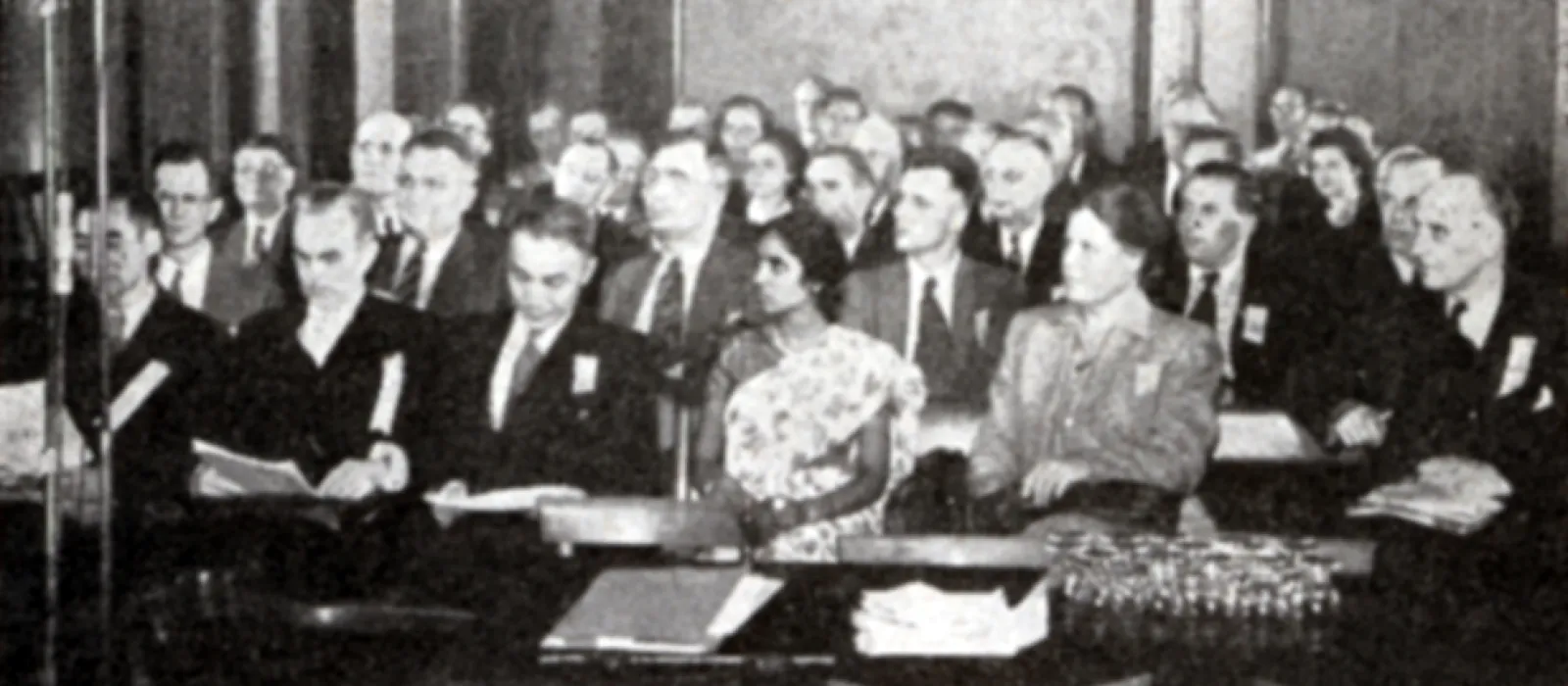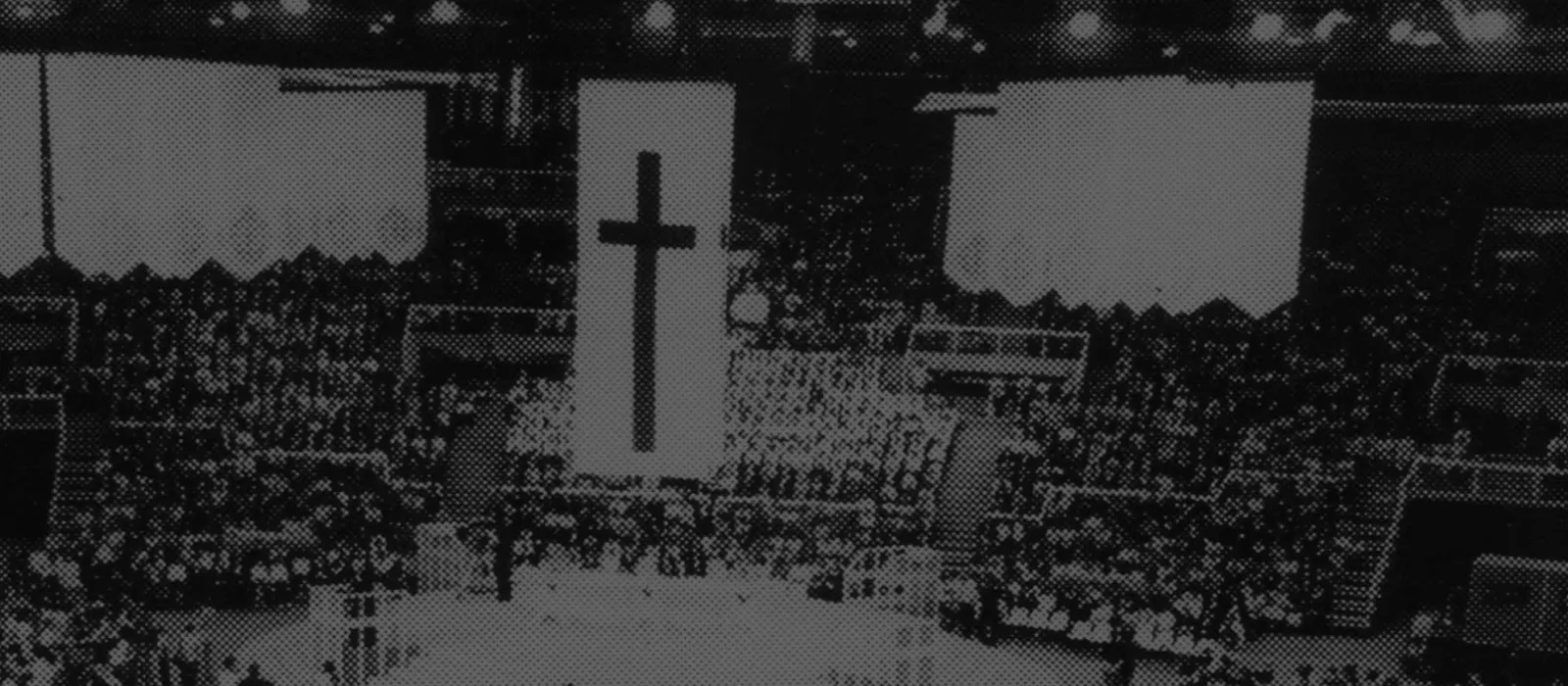- 1947 | Lund Assembly
- 1952 | Hanover Assembly
- 1957 | Minneapolis Assembly
- 1963 | Helsinki Assembly
- 1970 | Evian Assembly
- 1977 | Dar-es-Salaam Assembly
- 1984 | Budapest Assembly
- 1990 | Curitiba Assembly
- 1997 | Hong Kong Assembly
- 2003 | Winnipeg Assembly
- 2010 | Stuttgart Assembly
- 2017 | Windhoek Assembly
First Assembly of the LWF
Host Country: Lund, Sweden
Theme: The Lutheran Church in the World Today
Dates: 30 June – 6 July 1947
Two hundred voting delegates met in Lund, Sweden, 30 June – 6 July 1947 for the Assembly that marked the LWF’s founding. Many came from bombed cities and countries drawn into the storm of World War II. Armed with the determination to forgive and rethink the vision of “the enemy,” they shared a commitment to seek new ways of living together in Christian communion.
Second Assembly of the LWF
Host Country: Hanover, Germany
Theme: The Living Word in a Responsible Church
Dates: 25 July – 3 August 1952
The Second Assembly was held in Hanover, Federal Republic of Germany, 25 July – 3 August 1952. It convened in a city scarred by World War II, but with a will to reconstruct. The LWF was the first large, international organization to meet in Germany after the war and to elect a German as its president.
Delegates took important decisions to strengthen the LWF, opening paths for laity and youth to participate in the life of the communion. The Departments of Theology, World Service and World Missions were established.
Third Assembly of the LWF
Host Country: Minneapolis, USA
Theme: Christ Frees and Unites
Dates: 15 – 25 August 1957
The Third Assembly was held in Minneapolis, Minnesota, 15-25 August 1957. Of the 241 delegates, 145 were from Europe, 60 from the United States and Canada, 16 from Asia, seven from Latin America, and five from Africa. In addition, 146 official visitors from member churches attended, as did 125 visitors from non-member churches. Several participants from Eastern Europe took part, despite visa difficulties.
A sense of optimism about the future of institutional religion flavored the Assembly. Delegates shared of struggles in their respective regions: Africans of overcoming colonialism’s legacy in their newly emerging nations; Asians of political opposition; and Europeans of the East-West divide.
Fourth Assembly of the LWF
Host Country: Helsinki, Finland
Theme: Christ Today
Dates: 30 July – 11 August 1963
The Fourth Assembly was held in Helsinki, Finland, 30 July – 11 August 1963. Opportunity was in the air. Communication was increasing between countries and continents. Technical progress was being made, as evidenced by the broadcasting service, Radio Voice of the Gospel, established by the LWF in Ethiopia. Ecumenical breakthroughs were happening, such as the Second Vatican Council and the LWF’s founding of the forerunner of the Institute for Ecumenical Research in Strasbourg, France. At the same time, the Assembly could not reach agreement on how to express the doctrine of justification in ways that were relevant for “people of today.”
Fifth Assembly of the LWF
Host Country: Evian, France
Theme: Sent into the World
Dates: 14 – 24 July 1970
The Fifth Assembly, 14-24 July 1970, was the most significant of all LWF Assemblies past and future. Attempts to meet in the German Democratic Republic were blocked by the East German government. Protests about human rights violations in Brazil stalled the first LWF gathering in the global South only five weeks before the opening session.
Moved to Evian, France, the Assembly was shaped by the pivotal role of youth delegates who demanded changes to the traditional ways of working and communicating. Delegates adopted a new LWF structure, passed a resolution on human rights, and recommended pulpit and altar fellowship between member churches.
Sixth Assembly of the LWF
Host Country: Dar-es-Salaam, Tanzania
Theme: In Christ – A New Community
Dates: 13 – 25 June 1977
The Sixth Assembly was held in Dar es Salaam, Tanzania, 13-25 June 1977, the first Assembly in Africa and the global South. Issues faced by African churches came to the fore. Delegates identified apartheid in the church in Southern Africa as compromising the integrity of the proclamation of the gospel. They also established a Lutheran perspective on mission, witness and global partnerships in mission. The Assembly moved to create a Youth Desk and laid the foundation for a Women’s Desk.
Seventh LWF Assembly
Host Country: Budapest, Hungary
Theme: In Christ – Hope for the World
Dates: 22 July – 5 August 1984
The Seventh Assembly was held in Budapest, Hungary, 22 July – 5 August 1984. The venue constituted another milestone: the first LWF Assembly and meeting of a major international Christian organization in the “Second World,” the then Communist countries of Central and Eastern Europe.
Delegates suspended the membership of two white Southern African churches due to their continued failure to end racial division in their churches. Member churches affirmed pulpit and altar fellowship through a constitutional change. The Assembly resolved to ensure an equal number of female Assembly delegates by the Ninth Assembly.
Eighth LWF Assembly
Host Country: Curitiba, Brazil
Theme: I Have Heard the Cry of My People
Dates: 29 January – 8 February 1990
The Eighth Assembly met in Curitiba, Brazil, 29 January – 8 February 1990, the first and long-awaited Assembly in Latin America. It was a time of extraordinary change with the fall of the Berlin Wall and the breakup of the Soviet Union.
Restructuring was at the center of the Assembly as well. Delegates affirmed the LWF’s self-understanding as a “communion of churches,” with significant changes to its constitution. They established equal representation of Southern and Northern member churches on the LWF Council. The Assembly also set a goal of achieving full communion between the Lutheran and Anglican traditions.
Ninth LWF Assembly
Host Country: Hong Kong, China
Theme: In Christ – Called to Witness
Dates: 8 – 16 July 1997
The Ninth Assembly met in Hong Kong, China, 8-16 July 1997, one week after the territory’s transfer of sovereignty by British authorities back to Chinese rule. This first Lutheran global meeting in Asia focused on the celebration of the LWF’s fiftieth anniversary. It set a process in motion for the acceptance by member churches of the Joint Declaration on the Doctrine of Justification between the LWF and the Roman Catholic Church.
For the first time, close to half of the delegates were women. The Assembly reaffirmed the communion’s commitment to women’s ordination, but acknowledged member churches’ varying views on the practice by urging reflection and dialogue.
Tenth LWF Assembly
Host Country: Winnipeg, Canada
Theme: For the Healing of the World
Dates: 21 – 31 July 2003
The Tenth Assembly was held in Winnipeg, Canada, 21-31 July 2003. Delegates adopted “The Lutheran World Federation – A Communion of Churches” as the LWF’s full name and affirmed regional ecumenical agreements for the first time.
The Assembly theme led to commitments to transform economic globalization; strengthen ministries addressing HIV and AIDS, violence and poverty; and defend the rights of indigenous peoples.
The denial of entry visas for 50 delegates and stewards highlighted the deeper issue of exclusion. Delegates moved to remove any existing barriers to a fully inclusive communion. The Assembly also called on member churches to engage in study and respectful dialogue on marriage, family and human sexuality.
Eleventh LWF Assembly
Host Country: Stuttgart, Germany
Theme: Give Us Today Our Daily Bread
Dates: 20 – 27 July 2010
The Eleventh Assembly was held in Stuttgart, Germany, 10- 27 July 2010. Delegates committed themselves to caring for God’s people and the creation.
They resolved to work for gender and intergenerational justice, food and climate justice, and fairness toward those affected by HIV and AIDS. Emphasis was made on promoting justice for migrants and relief for those who suffer under the severe conditions imposed by illegitimate debt. Assembly delegates affirmed that churches would speak out boldly and prophetically across ecumenical lines and with communities of other faiths.
One of the defining events of the Eleventh Assembly was an act of reconciliation and healing, during which the LWF formally asked the Mennonites for forgiveness for past persecution of Anabaptists, considered as the direct forebears of Mennonites.
Twelfth LWF Assembly
Host Country: Windhoek, Namibia
Theme: Liberated by God’s Grace
Dates: 10 – 16 May 2017
The Twelfth Assembly was held in Windhoek, Namibia, 10- 16 May 2017. The LWF issued 26 resolutions calling the communion and its member churches to take action on various issues of concern. And, in three public statements, the Assembly stated LWF’s position on the genocide in Namibia and the German-Namibian reconciliation process, unrest in Venezuela, and politicization of religion in Indonesia.
They gathered around the central theme, Liberated by God’s Grace. A theme which also framed the LWF’s approach to the 500th anniversary of Lutheran Reformation in 2017.
Taking the central theme as the starting point, the Assembly will structured its work around three sub-themes:
- Salvation - Not for sale
- Human beings - Not for sale
- Creation - Not for sale
These three sub-themes address the contextual challenges the Christian community faces in today’s world. They help to identify certain concepts, attitudes and global policies that people “liberated by God’s grace” reject since they are incompatible with the gospel.
The 12th Assembly outcomes can be found here.

